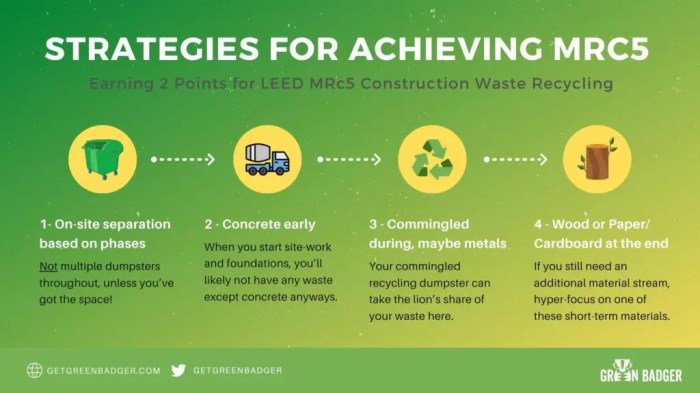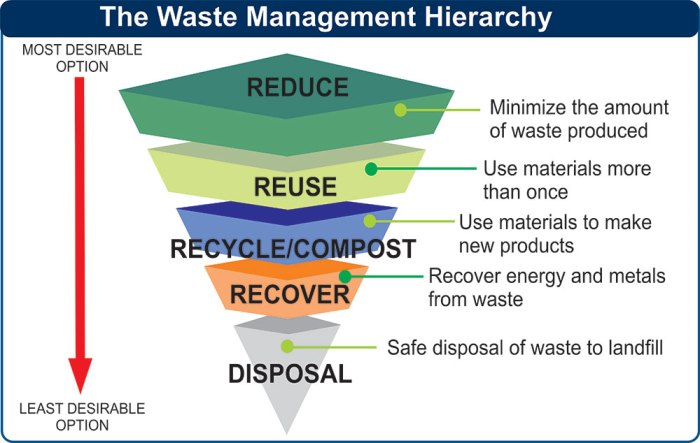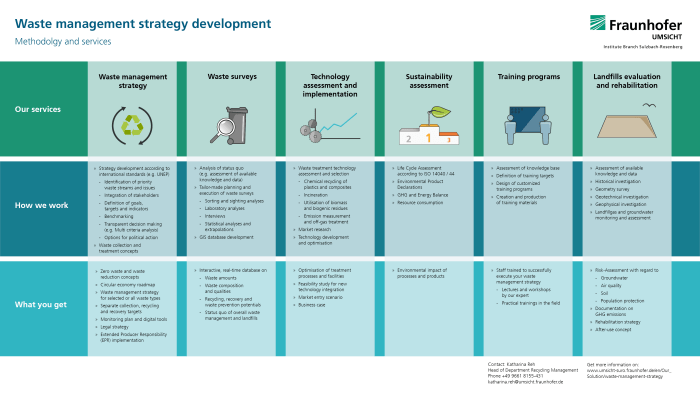Construction waste management strategies play a crucial role in ensuring sustainable and environmentally friendly construction projects. From reducing waste to implementing innovative technologies, these strategies are key to minimizing the impact of construction activities on the environment. Let’s delve into the world of construction waste management and explore the best practices that can transform the industry.
Introduction to Construction Waste Management Strategies
Construction waste management involves the practices and strategies put in place to reduce, reuse, and properly dispose of waste generated during construction projects. It is essential for maintaining a sustainable environment and ensuring the efficient use of resources.
Importance of Implementing Effective Strategies
Effective construction waste management strategies are crucial for several reasons. They help minimize the negative impact of construction activities on the environment, reduce costs associated with waste disposal, and promote recycling and resource conservation. By implementing these strategies, construction companies can improve their overall sustainability and contribute to a cleaner and healthier environment.
Environmental Impact of Improper Waste Management
Improper waste management in construction projects can have significant environmental consequences. It can lead to pollution of air, soil, and water resources, harm wildlife and ecosystems, and contribute to climate change. Additionally, improper disposal of construction waste can result in the depletion of natural resources and the loss of valuable materials that could have been recycled or reused. Therefore, it is essential to prioritize proper waste management practices to mitigate these environmental impacts.
Types of Construction Waste
Construction waste can be classified into various categories based on the materials involved. Some common types of construction waste include:
Concrete
- Concrete blocks
- Slabs
- Mixtures
Wood
- Timber
- Plywood
- Doors
Metal
- Steel beams
- Pipes
- Wire
Plastic
- PVC pipes
- Plastic sheets
- Wrappings
Bricks
- Brick pieces
- Damaged bricks
- Brick dust
Challenges Associated with Handling Construction Waste
Construction waste management poses several challenges due to the diverse nature of materials involved. Some of the challenges include:
- Segregation: Proper segregation of different types of waste is crucial to ensure effective recycling and disposal.
- Transportation: Moving heavy and bulky construction waste materials to recycling facilities can be logistically challenging.
- Disposal: Finding appropriate disposal sites that adhere to environmental regulations can be difficult for some types of construction waste.
- Recycling: Certain materials may require specialized recycling processes, which can be costly and time-consuming.
Best Practices for Construction Waste Management

Reducing, reusing, and recycling construction waste is crucial for sustainable development. Waste minimization in construction projects involves implementing strategies to reduce the amount of waste generated and divert it from landfills. Adopting sustainable practices in waste management not only benefits the environment but also improves the overall efficiency and cost-effectiveness of construction projects.
Key Practices for Reducing, Reusing, and Recycling Construction Waste
Implementing the following key practices can help construction companies effectively manage their waste:
- Plan ahead and estimate the amount of materials needed to minimize excess waste.
- Use prefabricated materials to reduce on-site waste generation.
- Separate materials at the source for easier recycling and reuse.
- Partner with recycling facilities to properly dispose of waste materials.
- Educate workers on the importance of waste management practices.
Concept of Waste Minimization in Construction Projects
Waste minimization in construction projects focuses on reducing the amount of waste generated, which includes avoiding over-purchasing materials, utilizing efficient construction methods, and implementing recycling programs. By minimizing waste, construction companies can lower disposal costs and minimize environmental impact.
Cost estimation methods play a crucial role in the construction industry. By utilizing accurate cost estimation techniques, project managers can ensure that projects stay within budget and on schedule. Various methods such as parametric estimating, bottom-up estimating, and historical data analysis are commonly used to forecast project costs.
For more information on cost estimation methods in the construction industry, you can visit Cost estimation methods in construction industry.
Benefits of Adopting Sustainable Practices in Waste Management
Adopting sustainable practices in waste management offers various benefits, such as:
- Reduced environmental impact by diverting waste from landfills.
- Cost savings through efficient use of materials and reduced disposal fees.
- Enhanced reputation and compliance with environmental regulations.
- Promotion of a culture of sustainability within the construction industry.
Technologies and Innovations in Construction Waste Management: Construction Waste Management Strategies

In the construction industry, advancements in technology have played a crucial role in improving waste management practices. From waste sorting to recycling, innovative approaches have been developed to effectively manage construction waste. Digital tools have also been instrumental in streamlining waste management processes, making them more efficient and sustainable.
Modern Technologies for Waste Sorting and Recycling
- Automated sorting systems using sensors and robotics to segregate different types of waste materials.
- Mobile waste shredders and crushers to reduce the size of waste materials for easier recycling.
- Advanced recycling technologies such as pyrolysis and plasma gasification to convert construction waste into valuable resources.
Innovative Approaches for Effective Waste Management
- Implementing prefabrication and modular construction techniques to minimize waste generation at construction sites.
- Using Building Information Modeling (BIM) to optimize material usage and reduce construction waste.
- Integrating circular economy principles to promote the reuse and recycling of construction waste materials.
Role of Digital Tools in Streamlining Waste Management Processes
- Waste tracking software to monitor the generation, collection, and disposal of construction waste in real-time.
- Mobile apps for on-site waste management, enabling workers to report and track waste generation efficiently.
- Data analytics tools to analyze waste data and identify areas for improvement in waste management practices.
Regulations and Compliance in Construction Waste Management
In the construction industry, proper waste management is not just a best practice but also a legal requirement to ensure environmental protection and public health. Let’s delve into the regulations and compliance aspects related to construction waste management.
Legal Requirements and Regulations for Construction Waste Disposal
Construction waste disposal is governed by various regulations at the federal, state, and local levels. These regulations typically specify guidelines for waste sorting, recycling, and disposal. For instance, the Resource Conservation and Recovery Act (RCRA) in the United States mandates proper handling and disposal of hazardous waste generated during construction activities. Failure to comply with these regulations can result in hefty fines and legal penalties.
Consequences of Non-Compliance with Waste Management Guidelines
Non-compliance with waste management guidelines can have severe consequences for construction companies. Apart from financial penalties, non-compliance can tarnish the reputation of the company, lead to project delays, and even result in project shutdowns. Moreover, environmental damage caused by improper waste disposal can have long-lasting impacts on ecosystems and communities.
Examples of Successful Waste Management Programs, Construction waste management strategies
Several construction companies have implemented successful waste management programs that not only meet regulatory standards but also promote sustainability. For example, Skanska, a multinational construction company, has achieved zero waste to landfill at many of its construction sites by implementing efficient waste sorting, recycling, and reuse practices. By setting ambitious waste diversion goals and actively engaging employees and subcontractors, Skanska has demonstrated that compliance with waste management regulations is achievable and beneficial for both the environment and the business.
Case Studies on Effective Construction Waste Management

Construction projects around the world have implemented various waste management strategies to minimize their environmental impact and improve overall efficiency. By analyzing real-world examples of successful waste management practices, industry professionals can gain valuable insights and key takeaways for their own projects.
Case Study 1: Sustainable Building Project in Singapore
- The project utilized a comprehensive waste management plan that focused on reducing, reusing, and recycling construction waste.
- By segregating waste on-site and working closely with local recycling facilities, the project achieved a recycling rate of over 90%.
- The outcomes included significant cost savings, reduced environmental impact, and improved reputation within the community.
Case Study 2: LEED-Certified Office Building in the United States
- The construction team implemented a waste management strategy that prioritized the use of sustainable materials and efficient waste disposal methods.
- Through careful planning and monitoring, the project was able to divert over 80% of construction waste from landfills.
- The benefits included LEED certification, lower operational costs, and increased tenant satisfaction.
Key Takeaways
- Collaboration with local recycling facilities is essential for achieving high recycling rates.
- Investing in sustainable materials and waste reduction practices can lead to long-term cost savings and environmental benefits.
- Certifications such as LEED can provide recognition and credibility for projects with effective waste management strategies.
End of Discussion
In conclusion, effective construction waste management strategies are essential for promoting sustainability and responsible practices in the construction sector. By adopting these strategies, companies can not only reduce their environmental footprint but also improve efficiency and compliance with regulations. Embracing a holistic approach to waste management is the way forward for a greener and more sustainable future.
Effective communication is essential for the success of construction projects. Clear and open communication among stakeholders, including architects, contractors, and clients, helps prevent misunderstandings and delays. Regular meetings, progress reports, and utilizing communication tools can improve collaboration and minimize errors.
To learn more about the importance of effective communication in construction projects, you can explore Effective communication in construction projects.